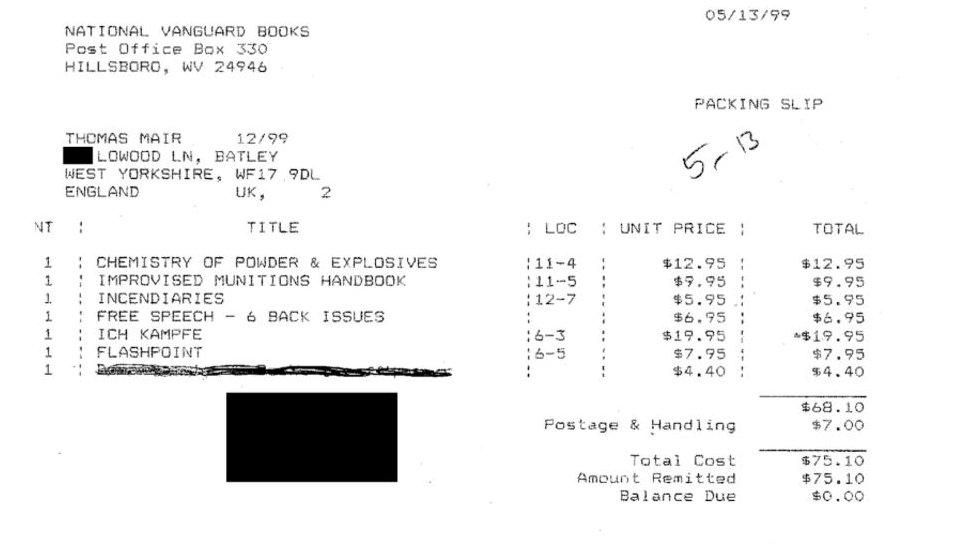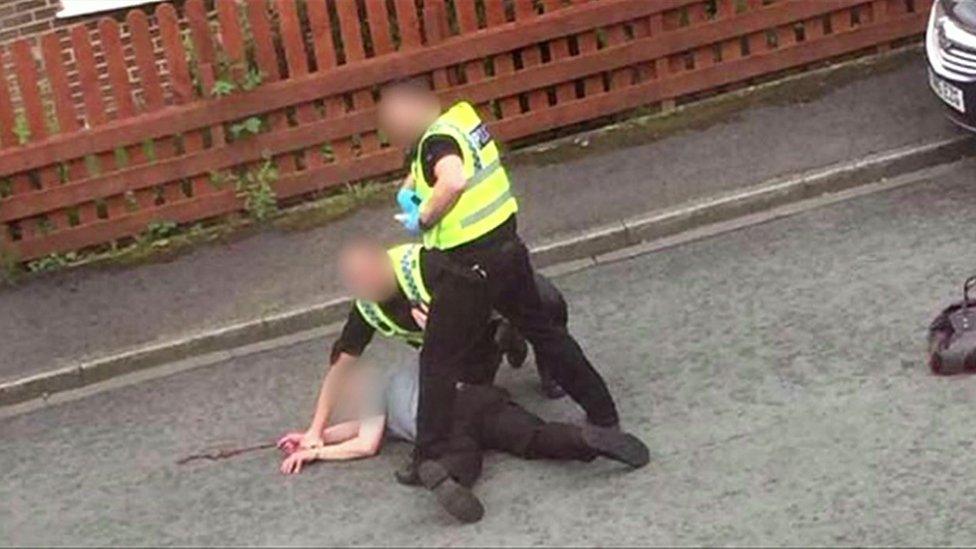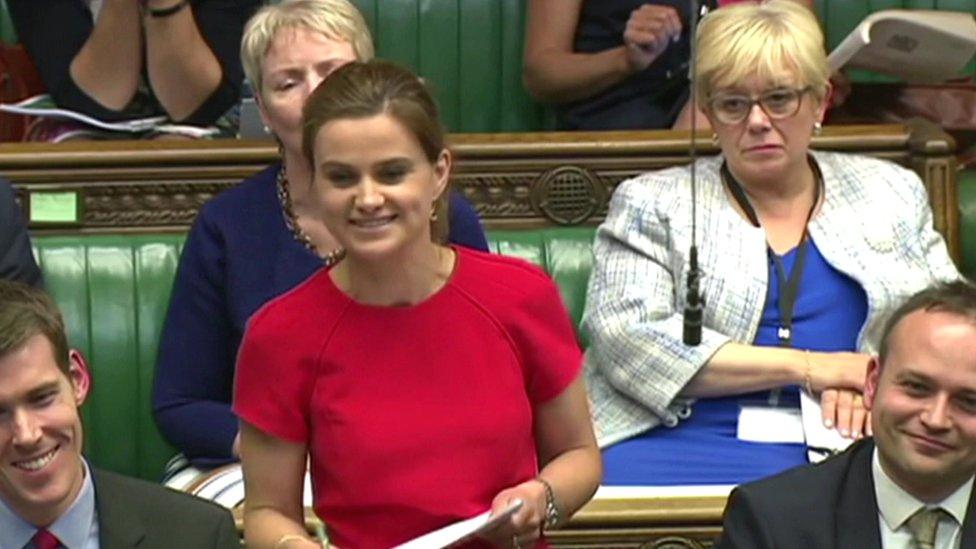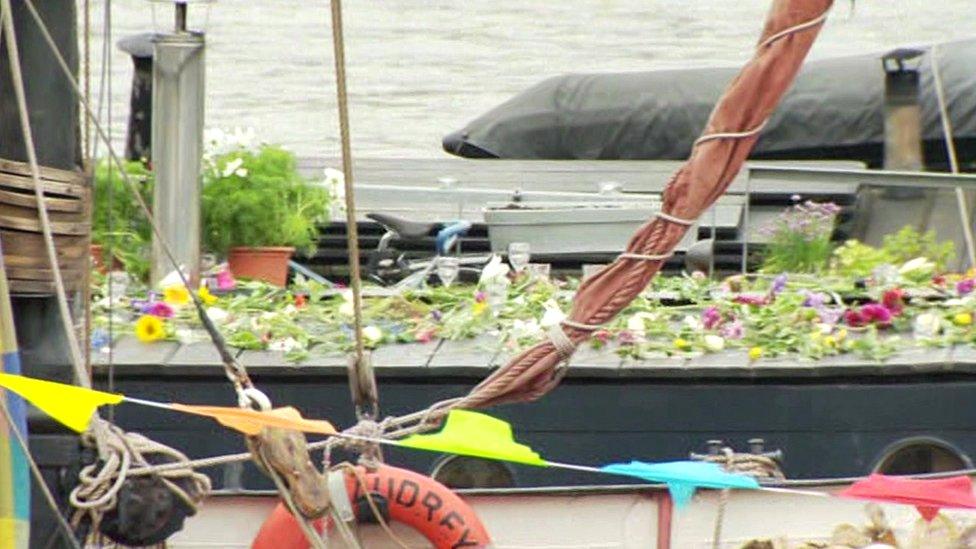Jo Cox death: What we know about the suspect
- Published
Quiet, bit of a loner, keen gardener - these are the main observations from people who knew the man held over the killing of Labour MP Jo Cox.
Named locally as Thomas Mair, the 52-year-old was arrested by police close to the home where he lived alone in Birstall, West Yorkshire.
There are reports that he had a history of mental health issues and that, as a young man, he may have had sympathy for far-right groups.
The BBC understands that during the searches of his house, detectives found Nazi-linked items including books and literature.
Witnesses reported that during the attack he shouted "Britain first" twice.
In a statement issued on Friday evening, West Yorkshire Police said links to right-wing extremism and the suspect's mental health were lines of inquiry, and went on:
"Based on information available at this time, this appears to be an isolated, but targeted attack upon Jo - there is also no indication at this stage that anyone else was involved in the attack. However, we will be investigating how the suspect came to be in possession of an unlawfully held firearm."
Mr Mair had been examined by "two specialist medical practitioners who have determined that he is both fit for detention and fit for interview", the statement added.
The force had earlier said it was working together with the North East Counter Terrorism Unit on the investigation.
Manual
Mr Mair's name appears on a website listing him as a past subscriber to the SA Patriot - a magazine published by a South African pro-apartheid group.
The magazine issued a statement confirming that he appeared to have been a subscriber back in the 1980s, but said his subscription was not renewed and that those involved in the publication had never met him.
Meanwhile a US civil rights group, the Southern Poverty Law Center (SPLC), claimed it had obtained records showing Mr Mair had links with the US neo-Nazi organisation National Alliance (NA) between 1999 and 2003.

The anti-hate campaign group posted images on Twitter showing what it claimed were receipts issued to him for books published by the NA, including a manual on how to make a homemade gun and a guide to explosives.
Richard Cohen, president of the SPLC, told the BBC that Mr Mair had also subscribed to a variety of white supremacist, neo-Nazi literature that the NA put out.
"The material presents this view that Aryan, white people are superior, that they need to separate themselves from other races and they need to do so violently if necessary," he added.
Prof Matthew Feldman, an expert on fascist ideology from Teesside University, said the receipts "appear to be genuine, appear to be in the weeks after the first neo-Nazi bombing spree that had been inspired by the internet in 1999".
It has emerged that the gun used to shoot Mrs Cox was not homemade, but was a real weapon shortened in some way.
The UK political party Britain First, which boasts of its hatred of white left-wing politicians, has issued a video statement condemning the attack and says that it had no connection with the incident.
'Hurt a fly'
Mr Mair had lived alone since his grandmother died 20 years ago.
His brother Scott, 50, told reporters on Thursday that his brother had a "history of mental illness" but that "he has had help".
Scott Mair told the Sun: "We are struggling to believe what has happened. My brother is not a violent man and is not that political. We don't even know who he votes for. I am visibly shaken at this news. I am so sorry for the MP and her family."
Mr Mair's half-brother, Duane St Louis, 41, told ITV he believed his brother "wouldn't hurt a fly".
"He's never expressed any views about Britain, or politics or racist tendencies. I'm mixed race and I'm his half-brother; we got on well," he said.
Thomas Mair spoke to a local newspaper six years ago about how volunteering at a park in Birstall had helped him with his mental health issues.
"I can honestly say it has done me more good than all the psychotherapy and medication in the world," he said.
'Taught English'
Mr Mair's mother Mary Goodall was said to be too distressed to talk to the media.
But at her bungalow, her good friend and neighbour Rosemary Surman spoke on her behalf.
"He used to come round - do her shopping, do her cleaning, very polite, very caring. It was just like last week we were saying what a good son he is how helpful he is."
Known to them as Tom, neighbours said they did not know him as someone who had long-term mental health issues, although he may have been treated for depression a long time ago.

Police said a man had been arrested in Market Street near the scene of the attack in Birstall
Police forensics teams searched Mr Mair's home on Thursday while his neighbours in Batley also described their shock over the news.
Diana Peters said she had known him since he was eight years old and he was "very quiet as a child... very quiet as a man". She said he was a "very bad epileptic as a child" and had never worked.
"Almost daily we chatted. We never spoke about politics," she said.
"He told me he was doing English as a second language to the Asian community in Dewsbury. That's what he told me, as far as I'm aware that was right, three days a week."
Mrs Peters, a nurse for 40 years, said he did not appear to have psychiatric problems
"He may have had some depression but he's lived alone most of his life," she added.
'Not in a million years'
One man said: "He's a very quiet person. He likes his gardening and stuff like that. He was a man of few words really."
Another neighbour said she had seen him outside the house on the morning of the attack. "He just walked past like he does," she said.
Another man who lived close by said: "When his image came up on the screen me and my wife said, 'not in a million years'. Of all the people in Birstall that I know, he would've been at the bottom of the list."
He described Mr Mair as shy, a loner, a "gentle, kind chap", a well-read man with whom he had talked politics and someone who never hinted at extremist views.
Marjorie Wallace, from the mental health charity Sane, said living alone and feeling disconnected from society was "fertile soil for extreme ideas, beliefs and hatred".
Loneliness was one of Mrs Cox's many campaigns both in her constituency and Westminster.
- Published17 June 2016

- Published17 June 2016
- Published17 June 2016

- Published17 June 2016
